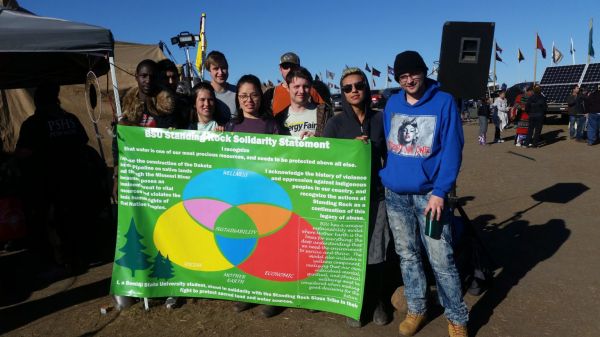Earth as Relative: An Indigenous Lens for Sustainability in Higher Education

For thousands of years, Indigenous peoples have depended on a sustainable relationship with the environment. Indigenous knowledge provides perspectives and approaches to sustainability that have withstood global change and are based on a deep respect for Mother Earth. Many of these perspectives are often quite different from those used in modern sustainability programs, which are largely based on the principles of Western worldviews. Western science, for example, uses impartial, linear thinking to provide generalizable explanations for how nature works (often with the help of technology), whereas Indigenous knowledge is more holistic and dependent on having in-depth knowledge of a particular place and on forming strong bonds with nature. Western worldviews say, “I am separate from and should control nature,“ while Indigenous knowledge says, “I am a part of and should work with nature.” Each has its benefits as we move towards a more sustainable future. As Earth’s climate continues to warm, global biodiversity continues to decrease, and soil and water quality continue to decline, different ways of thinking and knowing must be integrated into cultural norms.
This workshop is intended for faculty, administrators, staff and students of all disciplines and at all educational levels, as well as community leaders and change agents who wish to integrate sustainability and an Indigenous way of thinking into their work.
General Information
Workshop Dates: The event will last three days from June 16-19, 2020. The program starts at 2 p.m. on the 16th and will end at 2 p.m. on the 19th. All participants are asked to be present for the duration of the event.
Location: Bemidji State University, 1500 Birchmont Dr NE, Bemidji, MN 56601
Registration Fee: $395 (AASHE members), $495 (AASHE non-members), $175 (Student members), $195 (Student non-members) – Includes programming and the following meals: dinner on June 16; breakfast and lunch June 17, 18 and 19
Participant Engagement:
This workshop is designed for attendees to participate fully throughout the three days in exercises, discussions, personal reflection and planning so that they come away from the workshop with an understanding of potential next steps they can take on their own campuses. The format will include opportunities for participants to bring forward topics from their own experiences to inform the discussion and gain insight from the perspectives of the presenters as well as fellow participants.
Learning Outcomes
Workshop participants will be able to:
- Analyze their own attitude, behaviors, and beliefs regarding humans’ responsibility to the Earth.
- Define key terms of the time such as: treaties, colonization, sovereignty, environmental justice, reconciliation, privilege, trauma, and the 7th Generation;
- Describe Bemidji State University’s Wellness Model for Sustainability;
- Compare the holistic (physical, mental, spiritual and emotional) ways that Indigenous people consider or interact with the environment with the evidence-based (linear, objective, and measurable) way that Western scientists consider the environment.
- Identify and understand institutional racism and oppression found in education and analyze their impacts.
- Cultivate skillful means of communication and mindful inquiry through educational awareness, listening, patience and action.
- Consider a Land Acknowledgement for your workplace.
- Create space for diverse voices and be a good ally.
Organizers & Facilitators
- Erika Bailey Johnson, Sustainability Director at Bemidji State University and Northwest Technical College
- Beth Mercer-Taylor, Sustainability Education Coordinator, University of Minnesota, Twin Cities
- Ana Munro, Instructor of Creative Writing and Community Organizing, North Hennepin Community College




